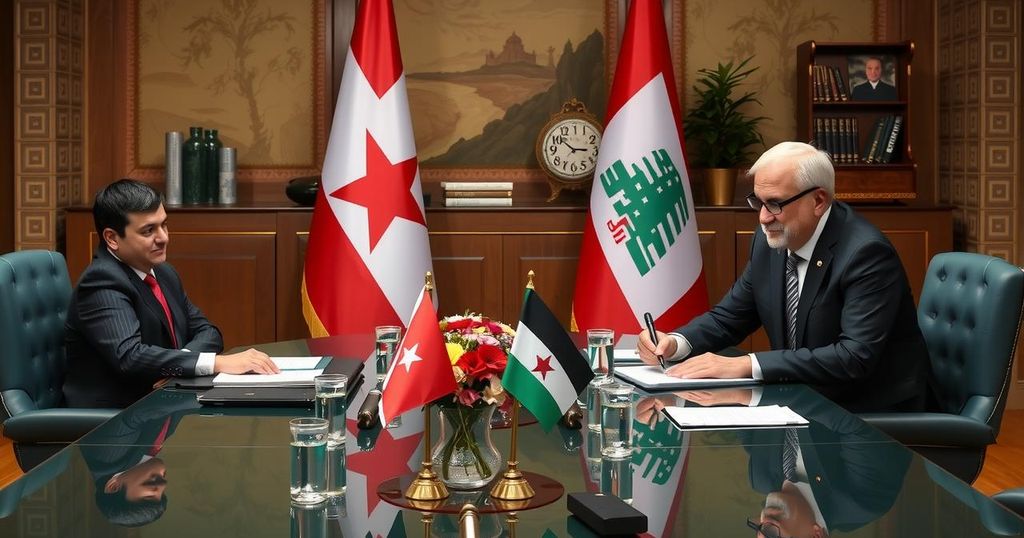Syria’s new leader, Ahmad Sharaa, seeks to establish long-term strategic ties with Lebanon, urging both nations to move past historical tensions rooted in Assad family rule. In discussions with caretaker Prime Minister Najib Mikati, Sharaa emphasized the importance of mutual respect and cooperation, particularly regarding border security and the plight of missing Lebanese citizens in Syrian jails.
Ahmad Sharaa, Syria’s newly appointed leader, has emphasized the importance of establishing long-term strategic ties with Lebanon, urging the nation to put aside the historical tensions rooted in decades of Assad family governance. During a joint news conference with Lebanese caretaker Prime Minister Najib Mikati, Sharaa declared that the recent visit marks a new chapter in bilateral relations, which are crucial due to their mutual interests. He expressed a desire to foster a positive relationship grounded in mutual respect for each country’s sovereignty.
The relationship between Lebanon and Syria has been fraught with challenges, notably stemming from Syria’s past military presence and political interference in Lebanon’s internal affairs, which persisted until 2005. Sharaa’s administration aims to move beyond the damaging legacy under previous regimes and address outstanding issues through open dialogue and consultation. Key topics of discussion included securing the borders between the two nations, particularly concerning illegal crossings associated with smuggling.
In light of the geopolitical shifts following the ousting of Bashar Assad, Sharaa pledged a balanced approach, stating that new Syria would not favor any particular Lebanese faction over another. This strategy contrasts sharply with previous interactions when Syria heavily influenced Lebanese political decisions. Mikati outlined essential priorities, including the delineation of land and sea borders, and the need for stringent control to prevent any potential security threats.
The talks also touched upon the plight of Lebanese citizens missing in Syrian jails, with Mikati committing to provide the new Syrian administration with the names of those unaccounted for. Sharaa notably expressed concern for the fate of American journalist Austin Tice, confirming that efforts to locate him alive would be prioritized. Overall, both leaders expressed a commitment to redefining and strengthening the intricate relationship between their respective nations.
Historically, the relationship between Syria and Lebanon has been complex and often contentious, characterized by Syria’s military intervention and political dominance over Lebanese affairs for several decades. Following the conclusion of Lebanon’s civil war in 1990, Syria was granted de facto governance, facilitating a significant role in Lebanon’s political appointments and foreign policy decisions. The dynamics shifted dramatically in 2005 after the assassination of former Prime Minister Rafik Hariri, leading to international scrutiny and the eventual withdrawal of Syrian forces from Lebanon. Recent events, including the civil war in Syria and the weakening of Hezbollah, have influenced the need for new diplomatic strategies between the two nations.
In conclusion, Ahmad Sharaa’s remarks alongside Prime Minister Mikati signify a potential shift in Syrian-Lebanese relations, aiming to overshadow the divisive history of the past. This new chapter could foster collaboration based on mutual interests and respect for sovereignty, with a focus on addressing critical border security issues and the welfare of Lebanese citizens missing in Syrian custody. The commitment to forge a balanced partnership represents an opportunity for both nations to navigate a complex regional landscape effectively.
Original Source: www.upi.com






